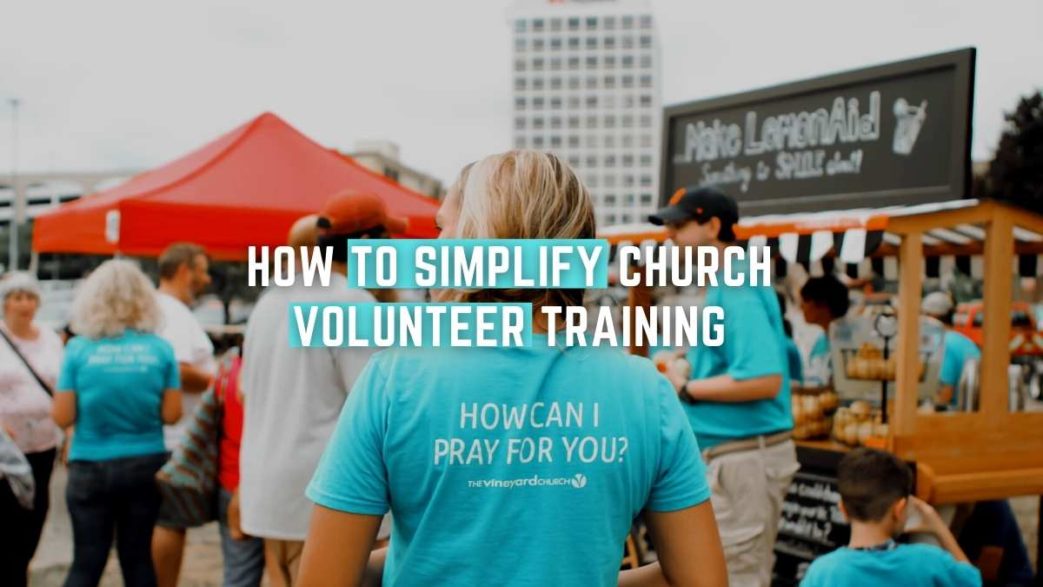Volunteering is a big commitment, which is why churches often struggle to recruit enough volunteers. However, simplifying the church volunteer training process can help.
When volunteers don’t know what they’re doing or leadership is contradicting each other, volunteers burn out quickly. They get confused and frustrated.
Create a more team and family-oriented group by using the right training process. Make this process easy and your volunteers will stick around longer and even ask their friends to help out too.

Ask Current Volunteers What They Needed
The first step is the simplest. Ask your current volunteers what they needed when they first started. Talk about any resources they wish they’d had or would still love to have.
Odds are, there are likely areas where the process was complicated or fell short. Getting insight from the people who’ve been through it is the perfect way to start simplifying your current process.
Also, talk to past volunteers, especially those that didn’t last long. Sometimes, volunteers just have enough. Whether it’s too much on their plate or trouble getting along with their fellow volunteers, there wasn’t anything your church could do. However, a better training process could’ve been exactly what would have helped them to stay.
Provide A Volunteer Training Portal Online
Your church website isn’t just for helping new visitors find you online. It’s a community to help boost engagement, increase volunteering, improve tithing and of course, add in church volunteer training.
The first step is to create a volunteer training portal online. This can be a password protected section or leave it open. If you’re including material on leadership and teamwork, more than just your volunteers might benefit. However, if you’re handling volunteer registrations and any personal details, ensure this is all encrypted and password protected.
Your volunteer portal is a place filled with resources. From guides and FAQs to describing volunteer opportunities, everything potential and new volunteers would need to know should be in this single place.
Having everything in one location drastically simplifies training. Plus, offering it in a digital format ensures even if someone loses a piece of paper, they can find it online again easily. Of course, for anyone without Internet access, print off the resources or provide an in-church computer for them to use.
Create A Training Guide With FAQs
Your new volunteers are going to have a lot of questions. You could spend hours in training sessions answering them or let them ask along the way. However, many may not even know what to ask, especially if they’re new to volunteering.
Create a training guide that includes what you expect from them, especially time commitments, along with FAQs. By answering the most common questions in a simple list format, volunteers are able to get started faster while better understanding the part and purpose they’ll play in the church.
Carey Nieuwhof lists seven important questions you should add to the list. These are common concerns of volunteers, such as how volunteering will help them spiritually and am I stuck once I start.
Assign At Least Two Mentors
When it comes to church volunteer training, it’s hard for a single person to do everything. However, it’s important to note that mentors aren’t always the main person in charge. These are additional leaders who have experience and have grown through that experience.
To aid in the process, especially if you’re a faster growing church, assign at least two mentors to your trainees. These mentors are responsible for answering questions, welcoming new volunteers and even working alongside them as they learn their responsibilities.
You likely already have a handful of volunteers that have worked for your church for years. Pick out a few who would be willing to help teach the new generation of volunteers.
This helps your volunteers get on board quicker and feel more like part of the family. Plus, it introduces them to people who are truly dedicated to the church, letting them see how volunteering can help them grow as individuals and spiritually.

List Responsibilities For Every Project
How often have you listed or told members about a volunteer opportunity only to have eager volunteers quickly drop out once the project starts? While some may just not like the work, most had no clue what the responsibilities were to begin with.
Volunteers might be in over their heads if a specific opportunity isn’t something they’re skilled with. For instance, if you need volunteers to help with props for church plays, you might get a lot of help. But, if everyone’s having to paint intricate sets or use power tools to build sets, you’ll have quite a few people drop out.
Simplify church volunteer training by ensuring on the right people sign up for each opportunity. While you can have a general volunteer category, also list every volunteer opportunity along with a detailed list of responsibilities and necessary skills.
If mentors are willing, list any skills where training is provided. Also, list the time requirements and tentative schedule. After all, the schedule may change slightly once a volunteer team is put together.
Offer Remote Volunteer Training
One of the biggest volunteer complaints is simply not having enough time. Simplify the training process to save your volunteers’ time. While some may still prefer in-person training, offer remote volunteer training too.
These can be pre-recorded videos or video chat sessions. Offer them at multiple times on multiple days to better meet your volunteers’ schedules.
Remote training lets them train from the comfort of their own homes without having to rush from work to church to back home to cook dinner and tuck the kids into bed. Plus, it seems like a much smaller time commitment if that’s what’s causing potential volunteers to shy away.
Create A Set Church Volunteer Training Process
Do you have a clear church volunteer training process in place or do you just play it by ear? Winging your training process never turns out as well as you might hope. Someone always misses something and you’ll likely have a lot of communication issues.
Sit down and create a step-by-step approach to welcoming and training new volunteers. This should include things like:
- What resources to place online
- What times and dates to offer training, remote and in-person
- Who your mentors are
- How you’ll welcome new volunteers
- What topics to cover for each type of volunteer
- How you’ll answer questions (email, text, phone, website, in-person)
- How volunteers can interact with each other outside of church
Having a set process keeps trainers on track. Plus, volunteers don’t fall through the cracks.
Create A Volunteer Group Or Forum
Sometimes, the easiest way to train new volunteers is to let them interact with your current volunteers. This isn’t always easy to do outside of volunteer activities.
To help, create a volunteer group or forum for everyone to interact. They can ask questions, get insight on what to really expect and even start making new friends before their first on-site volunteer session.
Facebook Groups are a great way to do this. These are completely free to create and use. You can even create private groups so only the people you invite can join. This creates a safe, fun place for all your volunteers to socialize, make plans, discuss issues and more. Facebook often works well since many of your members may already use the platform.
Of course, you can also create a forum on your church website. Users log in and start interacting. If you’re using a forum for more than volunteering, you can limit access to specific areas of the forum if you need to.
However, don’t create both. Simplify training by having a single place for your volunteers to socialize online. Otherwise, you’ll have part of your volunteers in one place and the rest in another, which doesn’t help anyone.

Provide Office Hours For Any Questions
No matter what you do, new volunteers will still have some questions you didn’t anticipate. In your volunteer training portal, list your office hours where you’ll be available to answer any questions.
Offer a way for volunteers to submit questions online. This could be a form on your website, email or social media. List your contact details on your volunteering page to make it easier to reach you.
By knowing someone is actually available at a set time to answer questions, volunteers feel more comfortable joining. Plus, it makes training them much easier.
Use Training Videos
Lengthy documents are useful, but may not be as effective as you’d hope. Instead, you might just have people who quickly scan the content, missing most of it. Then, you’re being bombarded with questions that were already answered in the training documents.
In addition to text-based training, use training videos. These can include examples of your volunteers in action so new volunteers can see how things work.
If you’re not sure where to start, Serve HQ provides several free church training videos to give you an idea. These aren’t all volunteer-oriented, but you can easily adapt the concepts to volunteering.
Ask your current volunteers to help out in the videos if necessary. They might act on example scenes to show what’s expected and how to act in different situations.
Videos are far more engaging and help trainees better retain the information. Anything that makes training easier is definitely a good thing.
Keep Training Short, But Efficient
Obviously, you want your church volunteer training to be thorough enough that volunteers feel ready when they get started. However, going overboard with training may just push your volunteers away. This is the last thing you want to do.
Instead, try to keep your training as short as possible. If you can condense a lengthy 10-page training guide into a 2-page list, do it. If you can cut down those four half hour videos into 10 minutes each, do it.
The longer your training, the more intimidating it is. Plus, it makes your volunteers afraid you’ll micromanage them once they do start.
A good way to keep training shorter is to only provide volunteers what they really need. For instance, volunteers helping out with events probably won’t need the same training as those working out in the community.

Introduce Volunteers To Each Other
When your volunteers are happy, they’re always happy to help out new volunteers. So, let your volunteers learn on the job so to speak. After some basic training, introduce volunteers to each other and start your new ones out with simpler tasks.
If possible, create a buddy system. You can even let new volunteers work in different areas to let them find what works best for them. By getting to know who they’ll be working with early on, they’ll feel more accepted, reducing their stress and helping them learn faster. This is all especially true for new members who haven’t gotten to know many other members yet.
Forums and groups work well for interacting, but introduce your volunteers to each other in person too. Of course, if you have any online-only volunteers, this can be more difficult. In this case, have group video calls for virtual face-to-face interactions.
Have A Single Person In Charge
This might sound like it goes against the two mentor suggestion above. However, mentors aren’t necessarily the person in charge. While your church should help people become leaders, both in volunteering and ministry, you still need a main person to lead.
For example, your church might have multiple pastors, but the senior pastor is still the one in charge. When it comes to volunteering, you need to have a single person over everything. That person can delegate tasks to other leaders and volunteers.
This helps simplify your church volunteer training by ensuring there’s one person to have the final say. Instead of 10 different people using 10 different processes, the leader has the final say on which process to use. They’re also the person volunteers can come to if they’re having trouble with someone.
As you can see, a church website is a vital volunteer training tool. Let us help you create the perfect church website to fulfill all your church’s needs.




